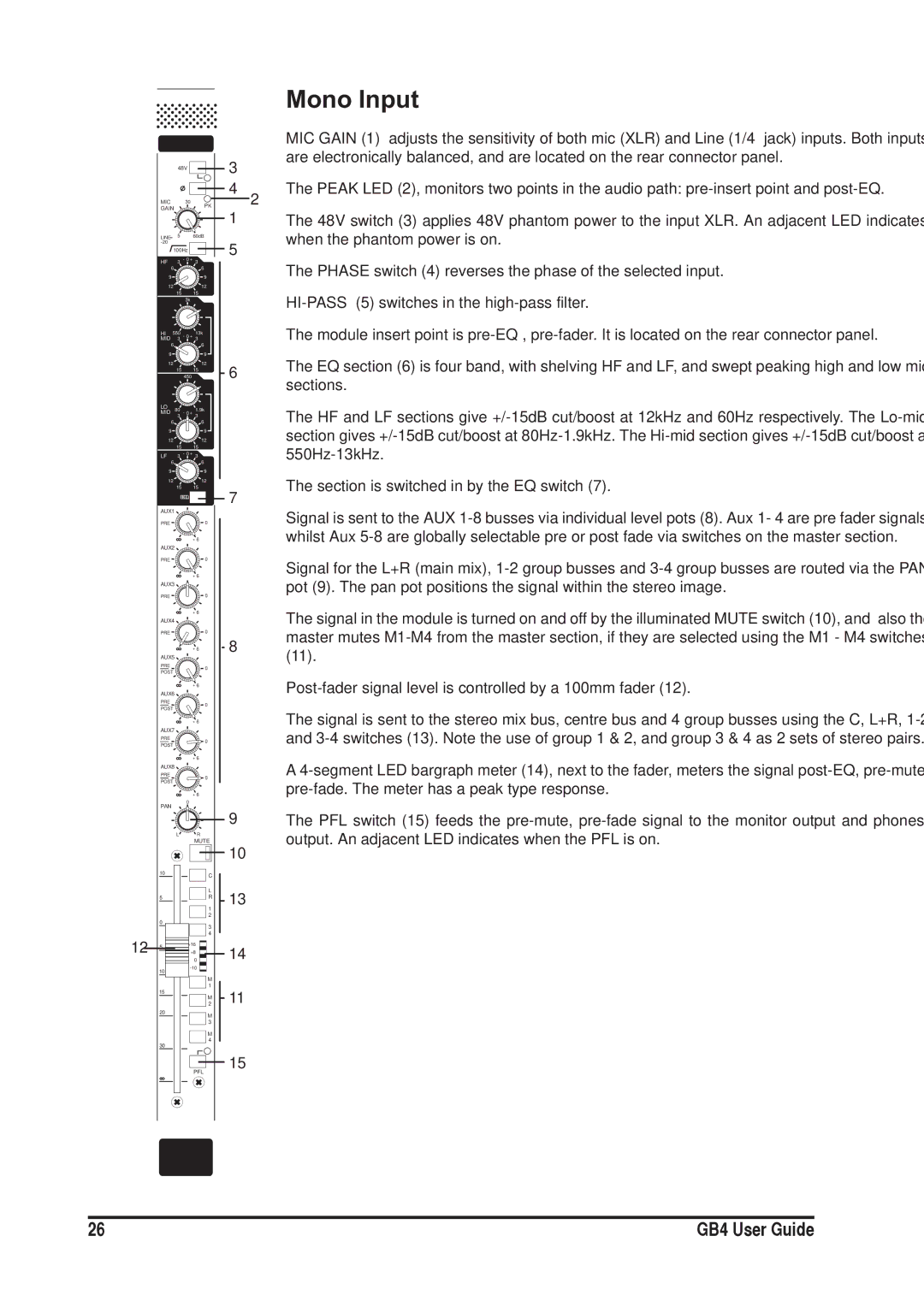
|
|
| 1 |
|
| 48V | |
MIC |
|
| 30 |
GAIN |
|
| PK |
LINE = | 5 | 60dB | |
|
|
| |
| 100Hz | ||
HF |
| 3 | - 0 + 3 |
6 |
| 6 | |
9 |
|
| 9 |
12 |
| 12 | |
|
| 15 | 15 |
|
|
| 3k |
HI | 550 | 13k | |
MID |
| 3 | - 0 + 3 |
6 |
| 6 | |
9 |
|
| 9 |
12 |
| 12 | |
|
| 15 | 15 |
|
|
| 450 |
LO |
| 80 | - 0 + 1.9k |
MID |
| ||
|
| 3 | 3 |
6 |
| 6 | |
9 |
|
| 9 |
12 |
| 12 | |
|
| 15 | 15 |
LF |
| 3 | - 0 + 3 |
6 |
| 6 | |
9 |
|
| 9 |
12 |
| 12 | |
|
| 15 | 15 |
|
| EQ | |
AUX1 |
|
|
|
PRE |
|
| 0 |
|
|
| + 6 |
AUX2 |
|
|
|
PRE |
|
| 0 |
|
|
| + 6 |
AUX3 |
|
|
|
PRE |
|
| 0 |
|
|
| + 6 |
AUX4 |
|
|
|
PRE |
|
| 0 |
|
|
| + 6 |
AUX5 |
|
|
|
PRE |
|
| 0 |
POST |
|
| |
|
|
| |
|
|
| + 6 |
AUX6 |
|
|
|
PRE |
|
| 0 |
POST |
|
| |
|
|
| |
|
|
| + 6 |
AUX7 |
|
|
|
PRE |
|
| 0 |
POST |
|
| |
|
|
| |
|
|
| + 6 |
AUX8 |
|
|
|
PRE |
|
| 0 |
POST |
|
| |
|
|
| |
|
|
| + 6 |
PAN |
|
| 0 |
|
|
| |
|
| L | R |
|
|
| MUTE |
3
4
1
5
6
7
8
9
2
Mono Input
MIC GAIN (1) adjusts the sensitivity of both mic (XLR) and Line (1/4” jack) inputs. Both inputs are electronically balanced, and are located on the rear connector panel.
The PEAK LED (2), monitors two points in the audio path:
The 48V switch (3) applies 48V phantom power to the input XLR. An adjacent LED indicates when the phantom power is on.
The PHASE switch (4) reverses the phase of the selected input.
The module insert point is
The EQ section (6) is four band, with shelving HF and LF, and swept peaking high and low mid sections.
The HF and LF sections give
The section is switched in by the EQ switch (7).
Signal is sent to the AUX
Signal for the L+R (main mix),
The signal in the module is turned on and off by the illuminated MUTE switch (10), and also the master mutes
The signal is sent to the stereo mix bus, centre bus and 4 group busses using the C, L+R,
A
The PFL switch (15) feeds the
12
10 |
|
|
|
|
|
|
| C |
|
|
|
|
|
|
|
|
|
| |
|
|
|
| ||||||
|
|
|
|
|
|
|
| L |
|
|
|
|
|
|
|
|
|
| |
5 |
|
|
|
|
|
|
| R |
|
|
|
|
|
|
|
|
| 1 |
|
|
|
|
|
|
| 2 |
| ||
0 |
|
|
|
|
|
|
| 3 |
|
|
|
|
|
|
|
|
| 4 |
|
5 |
|
|
|
| +16 |
|
|
| |
|
|
|
|
|
|
| |||
|
|
|
|
|
|
| |||
|
|
|
| ||||||
|
|
|
|
| +8 |
|
|
| |
|
|
|
|
| 0 |
|
|
| |
|
|
|
|
| |||||
10 |
|
|
|
|
|
|
| ||
|
|
|
|
|
|
| M | ||
|
|
|
|
|
|
|
| 1 |
|
15 |
|
|
|
|
|
|
|
|
|
|
|
|
|
|
|
|
| M |
|
|
|
|
|
|
| 2 |
| ||
20 |
|
|
|
|
|
|
| M |
|
|
|
|
|
|
| 3 |
| ||
|
|
|
|
|
|
|
| M |
|
30 |
|
|
|
|
| 4 |
| ||
|
|
|
|
|
|
|
|
| |
|
|
|
|
|
|
|
|
| |
|
|
|
|
|
|
|
|
|
|
|
|
|
|
|
|
|
|
|
|
|
|
|
|
|
| PFL | |||
|
|
|
|
|
|
|
|
|
|
1 |
|
|
|
|
|
|
|
| |
|
|
|
|
|
|
|
| ||
10
13
14
11
15
26 | GB4 User Guide |
